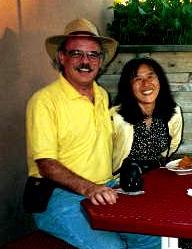
Winter 2007-2008
The Nature of Learning
Tribute to Harold Melville, 1945-2008
Securing Immigrant Rights In America
![]()
/Index/
/Letters/
/Profiles/
/Search/
/Podcasts/
![]()
Subscribe
for free!


Living Life to the Fullest
A Tribute to Harold "Mel" Melville
This article is meant to reflect the memories
and sentiments of people who knew Harold "Mel"
Melville, an American-born long-time professor
at Shiga University in Japan who passed away
on January 15th, 2008.
Much of the information shared here was
originally relayed via messages from
Melville's friends and colleagues on the
JALTTALK listserv. Harold Melville was
involved with JALT--the Japanese Association
of Language Teachers (Japan's affiliate
of International TESOL)--since the very
beginning of the organization. He taught
at Shiga University, in Hikone, Japan,
from 1975 until his death. According to
one JALTTALK message, Melville lived
through a "purge of non-tenured foreign
teachers" at Shiga University in recent
years and was nearing retirement.
A wake was held for Harold Melville in
Hikone on January 17th, and one JALTTALK
message reported that a copy of the
International Herald Tribune newspaper
was put into the coffin, noting that
"he always loved doing that crossword."
Another posting recounted how friendly
"Mel" was and how much he enjoyed
conversation. "I hope his cowboy hat
was in the coffin," expressed this
message, "I'll pick him out when
I get to heaven." One more individual
remembered get-togethers at "Sugimoto's"
in Hikoke, where Americans and local
Japanese engaged in "food and drink
and interesting multi-lingual conversation"
with Melville.
He was also interested in Apple
Macintosh computers and involved
in JALTCALL conferences. "He always
had some [Mac] trick to do something
I wanted to do," said one person who
remembered Melville on the JALTTALK
list.
Harold Melville's personal profile
on Taiken Moodle, which he posted in
2005, was as follows:
Melville's old home page was at:
That's unfortunate, because it was a really nice
Web presence, and provided wonderful information
and photos to express his obvious love of
Hikone and Shiga Prefecture.
Here is his answer to the question "Why
come to Hikone?"
All of the above images are from the
old Harold Melville Web site and are
used in accordance with the policy
posted there, crediting him and his
site as the source.
In his biographical statements on
his old Web page, he listed his areas
of interest as "Japanese History, the History of Shiga Prefecture and Hikone City; International Relations; Video and Manga in English Teaching"
and his research interests as "History of Shiga Prefecture and Hikone City; International Relations; [and the] Use of Video, Music and Manga (cartoons/comics) in the teaching of American and Western culture and history to Japanese English Students."
Harold Melville is survived by his
wife, Keiko, of the home.
Tribute Compiled By Robb Scott
2008 ESL MiniConference Online
PDF conversion by PDF Online
http://www.biwako.shiga-u.ac.jp/sensei/melville/melpage.html,
but that account is no longer functioning.
Hikone is an old castle town with almost 400 years of history. One of the earliest mentions of Hikone as a place name is in the Manyoshu,a compilation of poetry from the 7th and 8th centuries AD. The castle town dates from the early 17th century. The Tenshukaku (Main Donjon or Keep) of Hikone Castle is a Japanese National Treasure. It is situated on a low hill surrounded by greenery and bordered, on one side, by one of the most beautiful gardens in Japan, Genkyu-en. At one time, it was encircled by a series of four moats, only two of which exist today, the others having been filled in. The castle sits on its hill overlooking the Nakasen-do, the main road running through the province of Omi to Kyoto, the Imperial Capital.
Harold Melville's caption: This picture is of the Pond Garden in the rear area of
Ryotan-ji. Actually, this garden is on one side of a meditation room,
with a dry, or moss, garden on the other. It is a marvelous place to
sit and contemplate life, love, longing, death and rebirth.


Editor, ESL MiniConference Online
Robb@eslminiconf.net